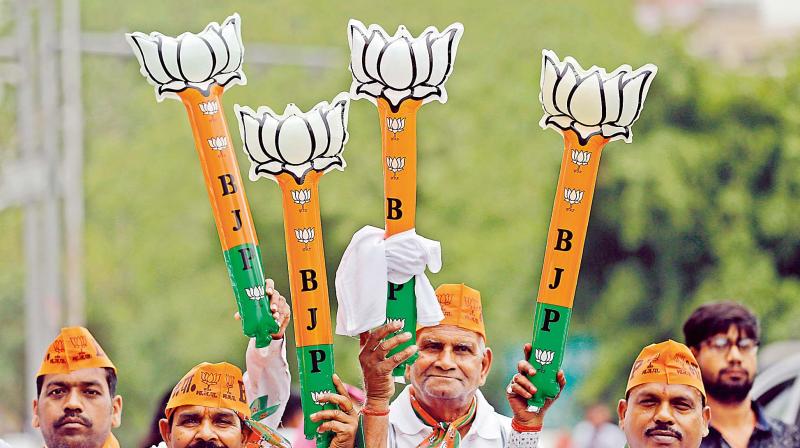Too many red cards don’t help
The EC is like a football umpire, whose primary obligation is to steer the electoral process to its logical conclusion.

It is tempting to come to the lazy conclusion that the Election Commission is subservient to the political party in power, and that it is not conforming to the high standards of impartiality for the conduct of fair and free elections. This has been a plaint against the commission during all the elections, including the years when the Congress was the ruling party.
It is not the case that everyone is playing by the rules. Parties in power misuse their position and the commission is not always able to rap them for their acts of omission and commission.
There has been much heat and no light about the discussion on NaMo TV, and very few have bothered to find out what it is about. The order shows that there is such a platform available which DTH operators are offering to prospective clients. But NaMo TV’s contents at election time were political and therefore needed pre-certification.
The commission then made public the rules of the game, which is an important aspect in itself. The issue is whether NaMo TV/Content TV, sponsored by the BJP, is following the rules or not, and whether Delhi’s Chief Electoral Office is ensuring that the channel is following the precertification process.
This is but one of the many cases of the acts of omission and commission of political parties and candidates that the commission is dealing with. It is easy for the critics to argue that the commission’s action is not enough. The critics would have wanted NaMo TV/Content TV to cease operations. But the rules do not require that. When the commission asks that pre-certification of content be ensured it has done its job.
The commission is not armed to its teeth and it cannot penalise political parties and candidates beyond a point. Those who argue that the commission should have the maximum powers to ensure free and fair elections do not realise the inherent dangers of making an institution a law unto itself.
The experience with Mr T.N. Seshan, who was Chief Election Commissioner in the 1990s and who is credited with empowering the commission, has shown that the commission or its commissioner should not be allowed to take centre stage. Mr Seshan did not just become the face of the EC but he became the EC, which is not a good thing.
The election commissioners of the day may appear meek compared to Mr Seshan, but, as long as they are following the rules, it is best that they remain invisible.
The series of orders that the EC has issued against Ms Mayawati (BSP), Mr Azam Khan (SP), Union minister Maneka Gandhi, Uttar Pradesh Chief Minister Yogi Adityanath, Mr Mukhtar Abbas Naqvi and Mr Satpal Satti (both BJP) show that the commission has adopted a judicious approach and that it is judging each case on its merits.
This approach might appear too cautious and ineffective to those who want ‘free and fair’ elections as they see it, and they want the EC to ensure it. What is forgotten is the fact that democracy and its processes cannot be ensured only through laws and penalties, and that the political players must adhere to the spirit of fair play.
The perception that unless the EC takes action against the party in power, its credentials as an impartial institution are not validated is quite dubious. An EC that shows bias against the party in power is as bad as one which toes the line of the government of the day. What is needed is that the rules are followed. As we have seen in the case of the EC’s order in the NaMo TV case, the directive is a fair one.
Indians are a litigious lot, and they would contest everything when it goes against them. So, a losing party and a losing candidate is inclined to complain against the rules to thwart processes that seem to go against him or her. Similarly, the party in power would want to sidestep rules and processes to have its own way.
The EC then has to hold the balance and see to it that the process of election is completed without too many disruptions, legal and otherwise. The umpire in a football match cannot dole out red cards to all the players because there would be no match left to play. He will have to fall back on the yellow card instead and steer the match to a conclusion.
The EC has an unenviable task. The Model Code of Conduct is to be used to conduct the elections and not to bring the process to a halt.

